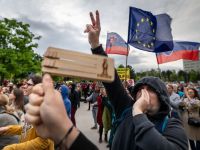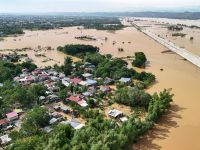Iraqi Kurds are extremely concerned about the emergence of a new Islamic militant group named Jund al-Islam. The group is also suspected of having close links with Osama Bin Laden and his Al Qaeda network.
Kurdish Islamic followers of Osama bin Laden, who are attempting to establish a Taliban-style group in northern Iraq, have set on a civil war estimated to have claimed the lives of more than 100 people, in various attacks, in a period of four months.
Jund al-Islam is operating in the mountains bordering Iran and has defied calls by Kurdish nationalists to break up, according to the British Guardian.
In one bitter incident, more than 40 nationalist fighters were reportedly butchered off and beheaded. Scenes of the grotesque act have been aired on local television.
The conflict between the fighters started shortly after the September 11 attacks in the United States, in a village near the town of Halabja, near the Iranian border, based on the edge of territory controlled by the Patriotic Union of Kurdistan (PUK) since the end of the Gulf war in 1991.
The victims of the September incident, according to an account by a PUK member, were taken by surprise by the Jund al-Islam militias.
Apparently, due to fear of being attacked, the PUK were the first ones to strike, but their offensive was repulsed. The PUK immediately sent in additional troops and eventually captured Halabja.
A man said to be Osama Bin Laden's representative to Jund al-Islam, Abu Abdul-Rahman, was killed during the fighting. The PUK has now pushed the group into the mountains bordering Iran.
Latif Rashid, the PUK's London representative, stated: "We have asked Jund al-Islam to surrender their arms and resettle themselves peacefully or action will be taken. "The clashes started among the Islamic groups, but they attacked forces sent to restore order. Some of them had trained in Afghanistan", according to the British publication.
Soldiers of Islam
Founded in September 2001, Jund al-Islam is the result of a merger between a number of fragmentized Muslim political forces that broke away, at various times, from the Islamic Unity Movement of Kurdistan (IUMK), an armed group that controlled Halabjah, and is believed to have Iranian backing.
Jund al-Islam is a hard-line offspring of the more moderate IUMK. The hardliners declared their jihad against the "secular... forces that are waiting for an opportunity to overpower Islam and the Muslims of Kurdistan; and waiting to implement the sinister plans of the Jewish, Christian and all other apostate leaders.".
The two central parties that control the Kurdish region, the PUK and the Kurdistan Democratic Party, outlawed the groups that merged eventually into Jund al-Islam after a series of assassinations and sabotage acts hit the main cities over the past two years.
After their formation, Jund al-Islam seized the villages of Tawela and Biyara near the Iranian border and introduced Taliban-style Islamic rule in the areas under their control.
The first Jund al-Islam decrees ordered shops to close during the call to prayers and outlawed any means of entertainment. The group declared: "Your brothers are busy preparing themselves for jihad [holy war] in this area. We have achieved this task by opening training camps, Islamic education camps and the preparation of necessary weapons”.
Bin Laden Connection?
PUK Head, Dr. Barham Salih, has stated that the group is completely funded by Osama Bin Laden’s al-Qaeda group. He added that 34 Kurds in the group are believed to have been trained in al-Qaeda bases throughout Afghanistan.
Abu Abdel Rahman, who has reportedly been killed in one of the fights was a Syrian who had been in Afghanistan for many years, and is said to have been Bin Laden's personal representative to the leadership of the group.
The group is apparently forming relations with Muslims and clergymen from different countries by seeking their advice and guidance and making use of their experiences.
The PUK released a list of names of Arab Afghans. It described them as leading figures of the group who train their members in assassination, in the use of explosives and other acts of sabotage, according to various reports.
Support from Tehran?
After the attack near Halabja, the PUK seized the IUMK-controlled town of Halabjah, but did not oust Jund al-Islam from Tawela and Biyarah villages. The PUK claimed that during the gun clashes, Tehran provided Jund al-Islam with logistic support.
"The PUK can't oust them from the area," said one source. "They would go to Iran if they were attacked and the PUK can't pursue them there." The IUMK's London representative, Ihsan Ali Abdalaziz, said that "If the PUK stops interfering in our internal affairs, Jund al-Islam will be easily contained and peace will return to the area.".
Abdalaziz also ruled out any connection between the group and Osama Bin Laden. (Albawaba.com)
© 2002 Al Bawaba (www.albawaba.com)







